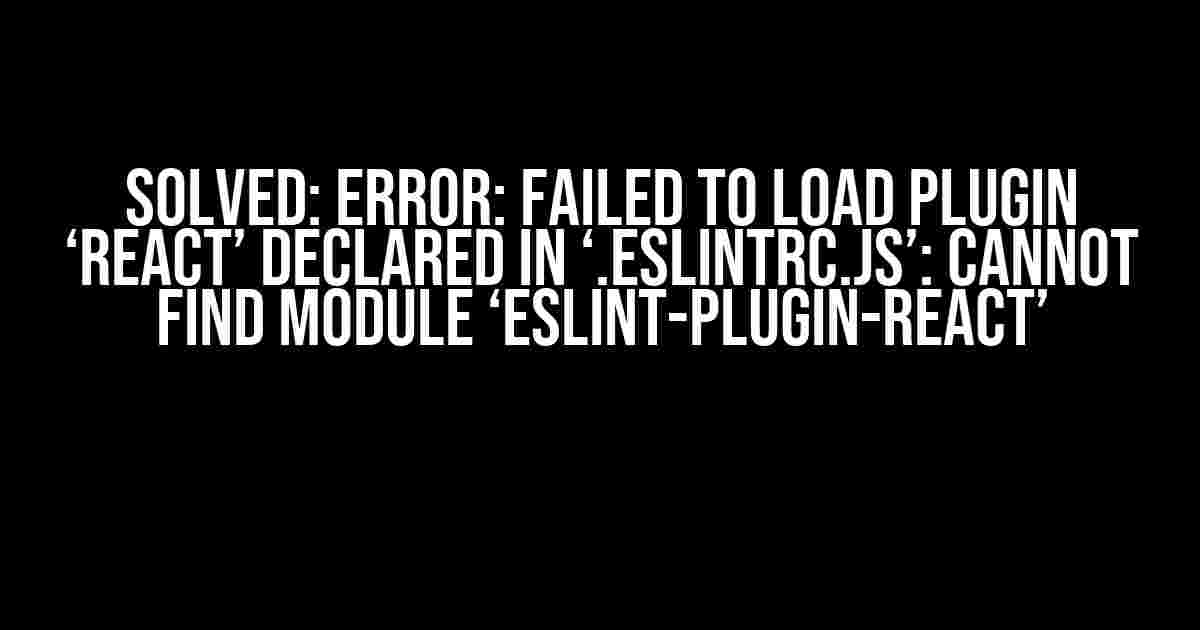If you’re reading this article, chances are you’re frustrated with the infamous error message that’s been haunting your code editor:
Error: Failed to load plugin 'react' declared in '../.eslintrc.js': Cannot find module 'eslint-plugin-react'Don’t worry, friend! You’re in the right place. In this comprehensive guide, we’ll embark on a journey to troubleshoot and resolve this pesky issue once and for all.
What’s the Deal with ESLint and Plugins?
Before we dive into the solution, let’s take a step back and understand the context. ESLint is a popular JavaScript linter that helps developers maintain code quality by identifying errors, enforcing coding standards, and providing suggestions for improvement. Plugins are essential components that extend ESLint’s capabilities to support specific features, frameworks, or libraries.
In this case, the error message is complaining about the ‘react’ plugin, which is specifically designed for React applications. The plugin provides a set of rules to ensure your React code is clean, maintainable, and follows best practices.
Why is ESLint Failing to Load the ‘react’ Plugin?
There are a few reasons why ESLint might fail to load the ‘react’ plugin:
- Missing or incorrect plugin installation: The ‘eslint-plugin-react’ package might not be installed or installed incorrectly, leading to the error.
- Invalid or outdated plugin configuration: The ‘.eslintrc.js’ file might contain incorrect or outdated configuration for the ‘react’ plugin.
- Conflicting plugin versions: Incompatible plugin versions can cause issues, especially if you’re using multiple plugins that rely on different versions of ‘eslint-plugin-react’.
- Corrupted or outdated Node.js or ESLint installation: A faulty Node.js or ESLint installation can lead to plugin loading issues.
Troubleshooting Steps to Resolve the Error
Now that we’ve covered the possible causes, let’s walk through the troubleshooting steps to resolve the error:
- Verify Plugin Installation:
npm ls eslint-plugin-reactor
yarn ls eslint-plugin-reactCheck if the ‘eslint-plugin-react’ package is installed and listed in your project’s dependencies. If not, install it using:
npm install eslint-plugin-reactor
yarn add eslint-plugin-react - Check ‘.eslintrc.js’ Configuration:
Open your ‘.eslintrc.js’ file and ensure the ‘react’ plugin is correctly configured:
module.exports = { // ... plugins: { react: { version: 'detect', // or specify a specific version }, }, // ... };Make sure the ‘react’ plugin is listed in the plugins object, and the version is set to ‘detect’ or a specific version that matches your project’s requirements.
- Check for Conflicting Plugin Versions:
Run the following command to check for conflicting plugin versions:
npm ls eslint-plugin-react eslintor
yarn ls eslint-plugin-react eslintIf you notice any version conflicts, try updating or downgrading the plugins to compatible versions.
- Update Node.js and ESLint:
If you’re running an outdated version of Node.js or ESLint, update them to the latest versions:
nvm install nodeor
nvm install latestnpm install eslint@latestor
yarn add eslint@latest - Delete ‘node_modules’ and Reinstall Dependencies:
As a last resort, try deleting the ‘node_modules’ directory and reinstalling your project’s dependencies:
rm -rf node_modulesor
rmdir /s /q node_modulesFollowed by:
npm installor
yarn install
Additional Tips and Recommendations
To avoid future issues, consider the following tips and recommendations:
- Keep your dependencies up-to-date: Regularly update your project’s dependencies to ensure you’re using the latest versions of plugins and libraries.
- Use a consistent plugin configuration: Establish a consistent plugin configuration across your project to avoid version conflicts and ensure seamless integration.
- Monitor ESLint errors and warnings: Keep an eye on ESLint errors and warnings to identify issues early on and prevent them from accumulating.
- Explore alternative linters and plugins: If you’re experiencing persistent issues with ESLint, consider exploring alternative linters like TSLint or JSLint, or plugins like Prettier.
| Scenario | Solution |
|---|---|
| Missing ‘eslint-plugin-react’ package | Install the package using npm or yarn |
| Invalid ‘.eslintrc.js’ configuration | Verify and correct the plugin configuration in ‘.eslintrc.js’ |
| Conflicting plugin versions | Update or downgrade plugins to compatible versions |
| Outdated Node.js or ESLint installation | Update Node.js and ESLint to the latest versions |
| Corrupted ‘node_modules’ directory | Delete ‘node_modules’ and reinstall dependencies |
By following these troubleshooting steps and tips, you should be able to resolve the “Error: Failed to load plugin ‘react’ declared in ‘../.eslintrc.js’: Cannot find module ‘eslint-plugin-react'” issue and get back to coding with confidence. Happy coding!
If you’re still experiencing issues, feel free to share your specific scenario in the comments below, and we’ll do our best to help you out.
Frequently Asked Question
Stuck with the frustrating error “Failed to load plugin ‘react’ declared in ‘../.eslintrc.js’: Cannot find module ‘eslint-plugin-react'”? Worry no more! We’ve got you covered with the top 5 FAQs to resolve this issue.
Why am I getting this error in the first place?
This error typically occurs when you’ve declared the ‘react’ plugin in your ‘.eslintrc.js’ file, but ESLint can’t find the ‘eslint-plugin-react’ module. This might be because you haven’t installed the ‘eslint-plugin-react’ package or haven’t linked it correctly.
How do I install the ‘eslint-plugin-react’ package?
You can install the ‘eslint-plugin-react’ package by running the command `npm install eslint-plugin-react` or `yarn add eslint-plugin-react` in your terminal. Make sure you’re in the correct directory and have the necessary permissions.
Can I use ‘eslint-plugin-react’ with ESLint versions older than 7?
No, ‘eslint-plugin-react’ is only compatible with ESLint versions 7 and later. If you’re using an older version of ESLint, you’ll need to upgrade to a compatible version or use an alternative plugin.
What if I’m using a Monorepo and the error persists?
In a Monorepo setup, you might need to install ‘eslint-plugin-react’ in the root directory or the specific package directory where your ‘.eslintrc.js’ file is located. You can also try specifying the plugin path in your ‘.eslintrc.js’ file using the ‘plugins’ option.
Are there any alternative plugins I can use if ‘eslint-plugin-react’ doesn’t work?
Yes, you can use alternative plugins like ‘eslint-plugin-jsx’ or ‘eslint-plugin-react-hooks’ depending on your specific use case. However, keep in mind that these plugins might have different configuration options and rules.
